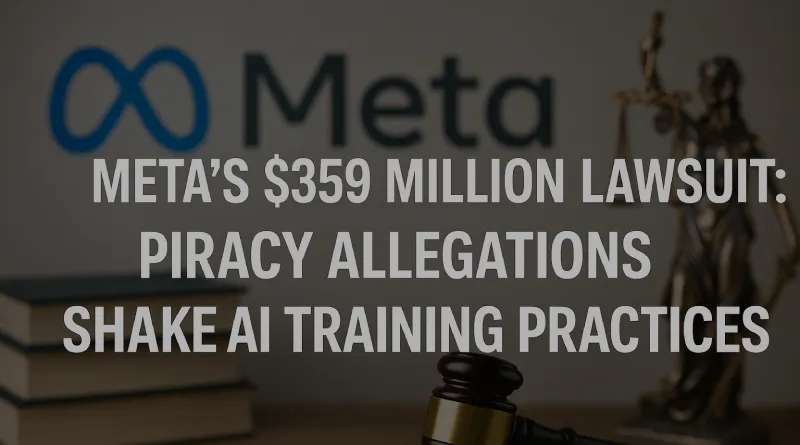Meta’s $359 Million Lawsuit: Piracy Allegations Shake AI Training Practices
Introduction
The name Meta Platforms, the parent company of Facebook and Instagram, has been in the news because of a high-stakes lawsuit stating that it has illegally downloaded over 2,400 adult movies via BitTorrent to use in training its AI models that could cost it up to 359 million dollars. Filed by adult film producers Strike 3 Holdings and Counterlife Media in a prescribed California federal court, the suit maintains that Meta not only pirated but also distributed the content, putting serious ethical and legal implications on the AI opera training practices. This article explores the significance of the lawsuit, proposes some exclusive insights into the Meta AI strategy, and discusses how it finds its application in the Indian environment, using the credible sources to present the thought-provoking and interesting analysis.
The Lawsuit: Allegations and Stakes
According to the complaint, in 2025 Meta filed a lawsuit alleging that the company has been downloading copyrighted pornographic movies since at least 2018 to train its AI, such as its Meta Movie Gen and LLaMA large language models. Meta, through the BitTorrent peer-to-peer infrastructure, acquired 2,396 films of brands such as Vixen and Blacked without the permission of the owners, according to the complaint. The plaintiffs argue that the actions of Meta are also a copyright infringement, both direct and secondary, because the company had not only downloaded it but also seeded those files, i.e., made them accessible to other users, including but not limited to minors, which violates children’s protection laws. The plaintiffs are demanding up to 150,000 dollars per work, or 359 million dollars, in statutory damages as well as an injunction to block Meta from using their works in that way.
As noted in the lawsuit, Meta is also accused of deploying tracking software, VXN Scan, that connected 47 IP addresses associated with Meta to the activity. The complaint states that the seeding on the part of Meta boosted its downloads, but at the cost of efficiency before ethics. The case is not the first of its kind in filing lawsuits against Meta, and in 2023, authors such as Sarah Silverman accused the company of training LLaMA on pirated books instead of the Library Genesis (LibGen). Although Meta was successful in that case based on the fair use theory of law, the case of sex films presents new layers of complexity because of the sensitivity of such materials and child safety regulations being breached.
Unique Insights: Ethical and Legal Implications
The lawsuit reveals a very important conflict in the AI sector: the balance between innovation and intellectual property. The data-thirstiness of AI development The use of pirated content Meta allegedly uses also sheds light on the data-hungry nature of developing AI, where large amounts of data are necessary in order to train complex models. There are, though, certain ethical issues associated with the usage of adult content, namely the chance of exposing underaggregates to explicit content using the unconfined networks provided by BitTorrent. The case may become a precedent in the laws that govern how courts interpret the concept of fair use in AI training and particularly when they are dealing with restricted content. The adult film case does not provide a favorable strength to the defensive action of Meta in fair use: as opposed to the case the authors encountered where Meta claimed that training on pirated books was transformative, this specific case focuses more on the effect of distribution, and this aspect could undermine the defense efforts of the company.
The other lesson that can be learned is that Meta is aware of the risks internally. According to court documents, it was revealed that Meta employees felt uneasy about torrenting through the corporate systems, and one of them mentioned it, stating that it did not feel right. However, it is claimed that the practice persisted with the consent of the executive team, even at the CEO level (Mark Zuckerberg), which calls the corporate governance aspects of AI application development into question. The case also brings to mind similar situations with transparency in the training data of AI, with Meta not describing their sourcing previously, leading to a call to reenact such a decision as the EU AI Act.

Local Context: Implications for India
In India, where Meta holds platforms such as WhatsApp and Instagram with a base of more than 500 million users, the lawsuit has a certain resonance, given the idea of the growing AI ecosystem in the country and the strict regulation of the content. The IT Rules, 2021, released by the Indian government, require effective content moderation, especially in the case of minors because of exposure to explicit content. The allegations of Meta adult content spreading through BitTorrent may raise some eyebrows of the Indian regulators owing to the concerns raised about the safety of the platforms. By way of example, in 2023, a lawsuit in the state of New Mexico against Meta suggested the company had deceived other advertisers, such as Match Group and Walmart, by allowing their advertisements to be shown alongside explicit or violent content, a search that resonated with the case brought against piracy about the endangerment of children.
In Indian startups and the developers of AI, the ripple effects may also occur. As India strives to build a hub of AI, the ethics of data activity are important. The case would compel Indian firms to adopt licensed datasets and the legal lines that Meta has to bear. Also, the Indian consumer who is so dependent on the platforms offered by Meta might insist on knowing where their information and content are going towards AI training, leading to the larger dialogue pertaining to digital ethics.
Challenges and Industry Impact
Defense: Meta argued that the accusations are not accurate, yet the company has yet to outline how its defense is to be carried out. The legal case may affect the further trial of other lawsuits against AI companies such as OpenAI and Anthropic, which have the same charge of piracy. Should the plaintiffs win, it might compel data gathering to revolutionize the practices of tech giants, however, raising expenses over licensed content. Nevertheless, a victory for Meta could act as a catalyst for companies to test the waters of fair use loopholes, which would entail a continuous whittling down of the rights of the creators.
The case also highlights the necessity of international traditions of training AI. Whereas the EU AI Act requires disclosure, no end-to-end AI regulations exist in the US such that the courts must figure out complicated catalogs of copyright. To creators, the lawsuit is an indication of how vulnerable intellectual property is in the era of artificial intelligence, which has seen activist groups such as the Authors Guild calling on authors and publishers to defend their rights.
Conclusion
The tech industry should wake up to reality because a company like Meta is taking on another company on a piracy accusation affecting artificial intelligence training worth 359 million dollars. It criticizes the unethical and illegal use of pirated content and pushes the companies to focus on responsible data behavior. This case may lead to more developed enforcement and consumer protection in India, where digital platforms and AI innovation are rapidly increasing. The battle will provide serious legal considerations, as the decision made will determine the future directions undertaken in the development of AI, between innovation and the rights of content generators.
Disclaimer
The information presented in this blog is derived from publicly available sources for general use, including any cited references. While we strive to mention credible sources whenever possible, Web Techneeq – Seo Company in Mumbai does not guarantee the accuracy of the information provided in any way. This article is intended solely for general informational purposes. It should be understood that it does not constitute legal advice and does not aim to serve as such. If any individual(s) make decisions based on the information in this article without verifying the facts, we explicitly reject any liability that may arise as a result. We recommend that readers seek separate guidance regarding any specific information provided here.

